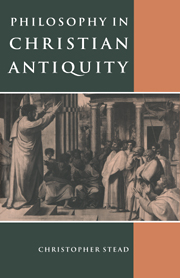Book contents
- Frontmatter
- Contents
- Preface
- List of abbreviations
- PART I THE PHILOSOPHICAL BACKGROUND
- PART II THE USE OF PHILOSOPHY IN CHRISTIAN THEOLOGY
- 8 The debate about Christian philosophy
- 9 Greek and Hebrew conceptions of God
- 10 Proofs of the existence of God
- 11 God as simple unchanging Being
- 12 How God is described
- 13 Logos and Spirit
- 14 Unity of substance
- 15 Substance and Persons
- 16 Christ as God and Man
- 17 Two natures united
- PART III AUGUSTINE
- Bibliography
- Index of Names
- Index of Subjects
13 - Logos and Spirit
Published online by Cambridge University Press: 29 September 2009
- Frontmatter
- Contents
- Preface
- List of abbreviations
- PART I THE PHILOSOPHICAL BACKGROUND
- PART II THE USE OF PHILOSOPHY IN CHRISTIAN THEOLOGY
- 8 The debate about Christian philosophy
- 9 Greek and Hebrew conceptions of God
- 10 Proofs of the existence of God
- 11 God as simple unchanging Being
- 12 How God is described
- 13 Logos and Spirit
- 14 Unity of substance
- 15 Substance and Persons
- 16 Christ as God and Man
- 17 Two natures united
- PART III AUGUSTINE
- Bibliography
- Index of Names
- Index of Subjects
Summary
Christians came to characterize God as a Trinity of Father, Son and Spirit, three Persons in one substance. We shall have to explain the meaning and background of the technical terms employed here; but some larger questions call for attention. Pure monotheism is commonly thought to be one of the great achievements of Israelite religion. Why then did later Judaism apparently complicate and confuse it with a doctrine of subordinate agencies and powers? And why did Christians pick out just two of these powers, God's Word and his Spirit, connect them with their master Jesus, and associate them with the Father in a triadic or trinitarian theology? We might, perhaps, explain this process theologically, in terms of a divine providence preparing the way for the later Christian doctrine; but this would not answer our perfectly proper historical enquiry into the stages by which the transformation came about and the human reflections which it involved.
The first question could be answered in general terms by saying that the Israelites found it necessary to envisage God both as enthroned in majesty above the heavens and as intervening actively in the affairs of men, to reward, to punish, or to inspire. The early Israelites pictured God as himself coming down and appearing in human form (see p. 100 above); but it was clearly naive to suppose that God could absent himself from heaven and attend exclusively to some particular human crisis. It was then supposed that God acts at a distance through the medium of subordinate spiritual beings, the angels.
- Type
- Chapter
- Information
- Philosophy in Christian Antiquity , pp. 148 - 159Publisher: Cambridge University PressPrint publication year: 1994



